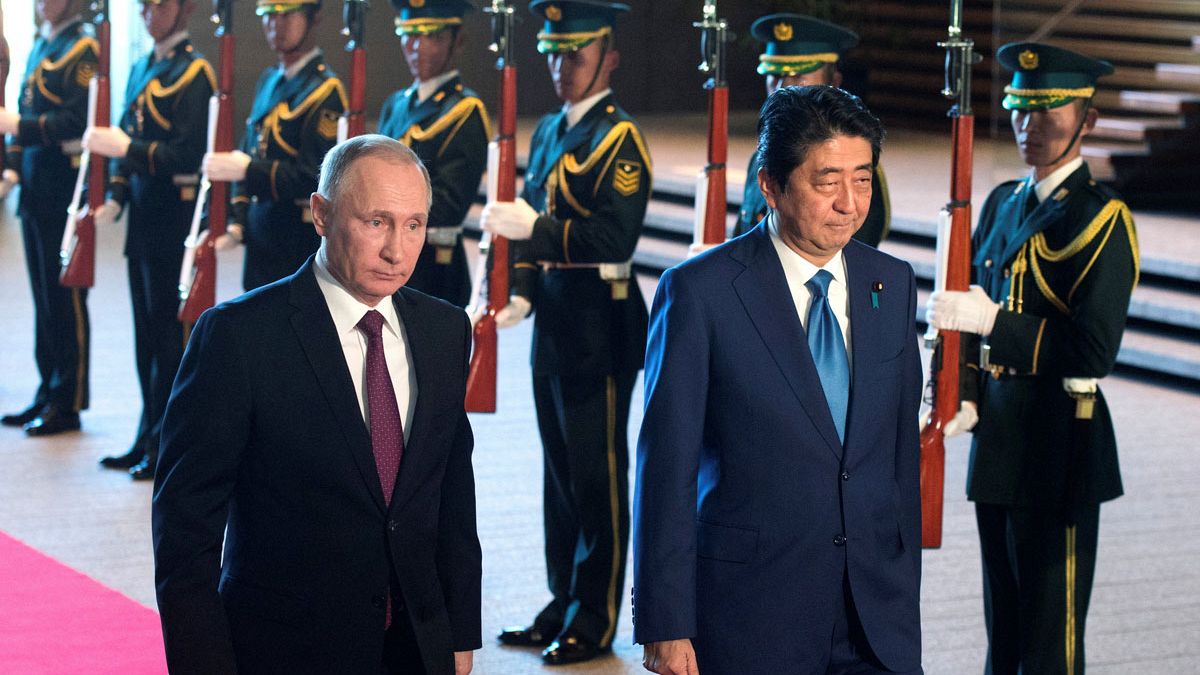There have been a number of economic deals at a summit in Tokyo but no breakthrough on a territorial row that has over-shadowed ties between Moscow and Tokyo since the Second World War.
Japanese Prime Minister Shinzo Abe and Russian President Vladimir Putin have agreed to begin dialogue on the status of disputed islands, which has left them technically at war since 1945.
They also made a number of economic deals across two days of talks in Japan.
#Nagato: Vladimir Putin has met with Prime Minister of Japan Shinzo Abe https://t.co/8gr4kfE66xpic.twitter.com/jtzNLPPNhi
— President of Russia (@KremlinRussia_E) December 15, 2016
Island strife
In a joint statement, Abe and Putin agreed to revive talks on joint economic activities on disputed islands at the centre of a territorial row.
It will be a step towards concluding a peace treaty formally ending the Second World War, the statement says.
Abe, Putin to huddle at hot spring over Japan-Russia islands row https://t.co/5mcF91YWxG
— Reuters Top News (@Reuters) December 14, 2016
Where are the islands?
In the Western Pacific.
Japan calls them the “Northern Territories” while in Russia, they are known as the “Southern Kuriles”.
They were seized by Soviet forces at the end of the war.
17,000 Japanese residents were forced to flee.
Why is this still a problem?
Because the dispute has prevented the two countries signing a peace treaty to formally ending the Second World War between them.
All 17-thousand Japanese residents of the islands were expelled to the nearby main Japanese island of Hokkaido.
Only around a third of them remain alive.
Russia controls the islands, but Japan also claims sovereignty.
In talks at a hot spring resort in southwest Japan on Thursday, the two leaders agreed on the importance of resuming security dialogue.
Ministerial-level security talks were halted after Russia annexed the Crimean peninsular in 2014, prompting Western countries to impose sanctions in response.
Japan says its sovereignty over all four islands be confirmed before a peace treaty is signed.
However, there have been signs it is rethinking its stance, possibly by reviving a formula called “two-plus-alpha”.
This is based partly on a 1956 joint declaration in which the Soviet Union agreed it would hand over the two smaller islands after a peace treaty.
Over the decades, the two sides have, at times, floated the idea of joint economic activity on the islands.
However, how to do this without undercutting either side’s claim to sovereignty has never been resolved.
What Japan is saying
“The issue won’t be solved if each of us just make their own case,” Abe told a joint news conference with Putin.
“We need to make efforts toward a breakthrough so that we don’t disapoint the next generation.
“We need to set aside the past and create a win-win solution for both of us.”
Rough road to Japan-Russia progress on Northern Territories pic.twitter.com/7RZs6YisOf
— japanenglishnews (@japanenglishne1) December 16, 2016
What Russia is saying
Vladimir Putin says economic cooperation would help set the stage for closer ties and invited Abe – with whom he has met more than a dozen times – to visit Russia again.
“I believe that joint work in economic areas will help to establish the basis needed to move to a relationship of true partnership,” Putin added.
Putin, Abe agree on joint Russia-Japan activities on Kuril Islands https://t.co/9QfYmn4LoC
— RT (@RT_com) December 15, 2016
The sticking points
Abe has pledged to resolve the territorial dispute in the hope of leaving a significant diplomatic legacy.
The aim is also to build better ties with Russia to counter a rising China.
The Japanese premier hopes the lure of economic cooperation for Russia’s economy, hit by low oil prices and western sanctions, will pave the way for significant progress on the dispute.
Putin, however, risks tarnishing his domestic image as a staunch defender of Russian sovereignty by compromising.
The business
Russian officials say the two sides have signed a total of 80 documents during Putin’s visit, including 68 on commercial issues.
However, commentaters say there is less substance than would be expected.
Despite strong pressure from the Abe adminstration, companies remain wary of the risk of doing business in Russia, according to Japanese officials.
“Hence, many of the agreements being announced are vague memorandums of understanding,” the unnamed official told reporters.
PM Abe held summit meetings with President Putin of #Russia in Yamaguchi and Tokyo on December 15-16 https://t.co/sRDNfDNYc7pic.twitter.com/L81mSFvYso
— The Gov't of Japan (@JapanGov) December 16, 2016
“Putin go home!”
As the two leaders headed for their second round of talks on Friday, right-wing activists circled the streets in trucks.
“Return the islands” and “Putin go home” was played out via loudspeakers.
